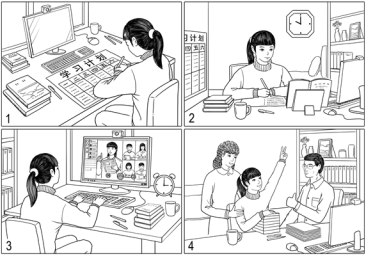When I lived in Boston, I taught English as a second language to adult students from around the world. On the last day, they threw a nice party. I was amazed they had learned enough English

__________________________________________________________________________________________________________________________________________________________________________________________________________________________________________________________________________________________________________________________________________________________________________________________________________________________________________________________________________________________________________________________________________________________
3 . Language Learning
Learning a new language can be tricky at any age. But in a recent study, scientists have pinpointed the exact age at which your chances of reaching fluency in a new language seem to quickly drop off: 10. Does this mean you should quit your French class if you’re older than 10? Non!
Kids may be better than adults at learning new languages for many reasons. Children’s brains are more adaptable than those of adults.
The findings also offer ideas for adults hoping to pick up a new language.
| A.Now that’s worth talking about! |
| B.But they are unlikely to become fluent. |
| C.The study appeared in the journal Cognition. |
| D.For the study, the researchers created an online quiz. |
| E.This means they’re better able to respond to new information. |
| F.This gave researchers huge amounts of data from English speakers of many ages and backgrounds. |
| G.Researchers found that people did better when they learned by immersion rather than only in a classroom. |
文中共有10处语言错误,每句中最多有两处。每处错误仅涉及一个单词的增加、删除或修改。
增加:在缺词处加一个漏字符号(∧),并在其下面写出该加的词。
删除:把多余的词用斜线(
 )划掉。
)划掉。修改:在错的词下划一横线,并在该词下面写出修改后的词。
注意:1.每处错误及其修改均仅限一词;
2.只允许修改10处,多者(从第11处起)不计分。
Today, millions of people want learn or improve their English. Which is good, to study in Britain or in your own country?
The benefits of going to Britain seems obvious. You will listen to the language all the time, surround completely by the language wherever you would go and have to speak English if you are with the local people. In China, there is always possible to speak Chinese in class and the learning is slower. However, there are also advantage of studying at home. You don’t have to make big changes to your life. Beside, it’s much cheaper than going to Britain.
In my view, for most people without enough money, being al home is their only choice. A most important thing to do in this situation is make good use of your opportunities—speaking only English in class and using English whenever possibly outside the class.



